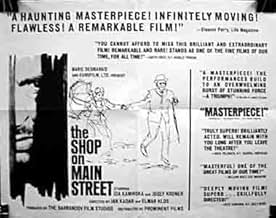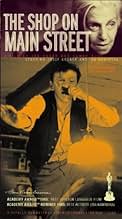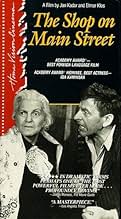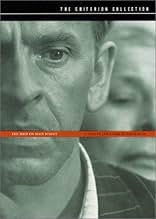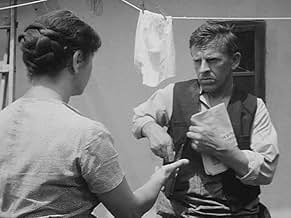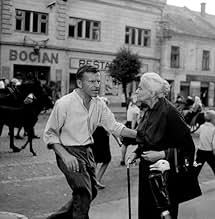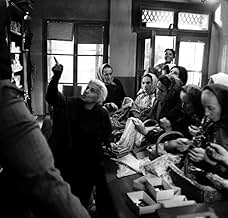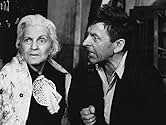NOTE IMDb
8,2/10
10 k
MA NOTE
Ajouter une intrigue dans votre langueA carpenter in the Fascist Slovak State is appointed "Aryan controller" of a Jewish widow's store.A carpenter in the Fascist Slovak State is appointed "Aryan controller" of a Jewish widow's store.A carpenter in the Fascist Slovak State is appointed "Aryan controller" of a Jewish widow's store.
- Réalisation
- Scénario
- Casting principal
- Récompensé par 1 Oscar
- 6 victoires et 4 nominations au total
Ida Kaminska
- Rozalia Lautmannová
- (as Ida Kaminská)
Frantisek Zvarík
- Markus Kolkocký
- (as Frantisek Zvarík)
Ladislav Farkas
- Young Man
- (non crédité)
Luise Grossová
- Eliasová
- (non crédité)
Juraj Herz
- Jewish Man
- (non crédité)
Avis à la une
I gave this one a 10 because it is one of the most moving and engaging films about the Holocaust I have ever seen. The film is masterful in its depiction of the duplicitous nature of average citizens in Central Europe during the rise of Nazism. During World War II, the region was pulled between fascism and communism. This film is very revealing in its ability to show the true nature of totalitarianism and how it can effect the common person. The acting is brilliant, especially in the case of the old lady who is the owner of the shop. This is one of the best Czech films from the 60s, even better than Closely Watched Trains, which is also very good. This is the type of film that stays with you in that it is both haunting and thought provoking.
10Buddy-51
The last half hour of this film may well be the most emotionally intense examination of a personal moral crisis ever put on film.
The movie achieves that rarest feat of being able to portray one of the most horrendous experiences in human history without resorting to sensationalism or sentimentality.
The acting of Josef Kroner and Ida Kaminska is without peer and the musical score is quite simply haunting and adds immeasureably to the film's overall effectiveness.
Make every effort to see this true cinematic masterpiece.
The movie achieves that rarest feat of being able to portray one of the most horrendous experiences in human history without resorting to sensationalism or sentimentality.
The acting of Josef Kroner and Ida Kaminska is without peer and the musical score is quite simply haunting and adds immeasureably to the film's overall effectiveness.
Make every effort to see this true cinematic masterpiece.
This film is one of the most gripping stories told about Nazi occupied Europe. A small town in 1942 Czechoslovakia feels the changing regime envelop the people, pinning friends against one another, and turning even the most pacifistic men into traitors. Small-time carpenter Tony is married to an attractive, but constantly nagging and complaining, materialistic woman. Seeing her in-laws successful, while exploiting the political advantages of working with the Nazis, makes Tony's wife ever more determined to have a "piece of the fortune" the Jews are said to have been hording. Although refusing to work at a "tower of Babel" the Nazis are erecting as a symbol of their glory (and doing without the money he could have earned), Tony doesn't speak out against the "new order" either.
When Tony finds himself as assistant to an old lady at her failing notions shop (which he "legally" was entitled to take over), he learns about the Jewish community, how everyone looked out for one another, and how these people were no different from other folk in town, if anything they were more human than the rest. Still afraid of retribution from the Nazis and their sympathisers, Tony is in a no-win-situation.
The final scene of this 1966 Best Foreign Film Oscar Winner was likely an inspiration for the final scene in the 1997 Blockbuster "Titanic". This cinematic gem serves as a reminder to the old German saying "Leben und leben lassen" (live and let live). A classic indeed!
When Tony finds himself as assistant to an old lady at her failing notions shop (which he "legally" was entitled to take over), he learns about the Jewish community, how everyone looked out for one another, and how these people were no different from other folk in town, if anything they were more human than the rest. Still afraid of retribution from the Nazis and their sympathisers, Tony is in a no-win-situation.
The final scene of this 1966 Best Foreign Film Oscar Winner was likely an inspiration for the final scene in the 1997 Blockbuster "Titanic". This cinematic gem serves as a reminder to the old German saying "Leben und leben lassen" (live and let live). A classic indeed!
In 1942, in a small town in Czechoslovakia, the poor carpenter Tony Brtko is assigned "Aryanizator" of a small shop on the main street by his fascist brother-in-law Mark Kolkotsky. His greedy wife Evelyn is seduced with the promise of fortune, but Tony finds that the store owned by the deaf and senile seventy eight year-old widow Rozalie Lautmann is bankrupted and the old lady is financially supported by the Jewish community that promises a salary to him to help her.
I have come to feel that the Czech film of the 1960s may be one of the best places and best decades in the history of film. The "new wave" there is far more interesting than anything that came out of France or Italy, and was a decade ahead of the United States.
This film manages to be a serious examination of an ethical conflict but still has a hint of humor and gaiety. Not enough to be offensive or dismissive of the subject matter, but just enough to remind us of the glorious Czech new wave.
I have come to feel that the Czech film of the 1960s may be one of the best places and best decades in the history of film. The "new wave" there is far more interesting than anything that came out of France or Italy, and was a decade ahead of the United States.
This film manages to be a serious examination of an ethical conflict but still has a hint of humor and gaiety. Not enough to be offensive or dismissive of the subject matter, but just enough to remind us of the glorious Czech new wave.
This movie is one of my all-time favorites. It depicts a lazy, self-interested "everyman" caught up in a personal struggle of good and evil. The directors/writers question the moral responsibility of genocide, as smalltown Czechs under Nazi domination respond to their Jewish neighbors. Jews are no longer allowed to own shops, so their businesses' control and ultimate ownership is turned over to Christians -- namely, Nazi sympathizers. One such Christian, brother-in-law of a high-ranking official, is given a button shop, owned by a deaf, elderly Jewish woman, who is not even aware that there is a war going on. Due to her deafness, she has the innocence of a child. The Christian overseer finds that the shop makes no money whatsover, but also learns that the Jewish community supports the old woman and will pay him a salary to watch over her. What develops is a platonic love story between the two, hilariously funny due to the old woman's inability to comprehend the impending doom around her, and her assistant's struggle to shield her from harm while concerned with self-preservation. The movie works on numerous levels -- as a love story, including dreamlike fantasy elements of a bygone world where Nazi horrors don't exist; and as a tale of ultimate moral responsibility. It is a story of basically good people, who say nothing, see nothing, hear nothing, and do nothing when genocide threatens their neighbors, and who thus enable genocide to occur. The brilliant combination of hysterically funny scenes set against a background of impending mass murder brings this film to a life that is lacking in most humorless holocaust-oriented films. The laughter through tears produces an ultimate impact that is emotionally devastating. This film justly received an Oscar for Best Foreign Film when it was released. It was produced during a brief high point of the Czech film industry, prior to Russia's reconquering of the country and squelching any artistic freedom. All the performers are exceptional, particularly the two leads. (After the Russian takeover, actress Ida Kaminski emigrated to New York and attempted to revive the Yiddish Theatre.)
Le saviez-vous
- AnecdotesThis movie was shot exclusively in the small Slovak city of Sabinov.
- GaffesSet in 1942, a German troop train moves through the town. The train is carrying Soviet cold-war era trucks and anti aircraft guns that didn't exist until the 1950s. It's understandable for them to make this substitution since any authentic German equipment would have been scrapped long before.
- Citations
Jozef Katz: I don't understand anything any more. But I know one thing. When the law persecutes the innocent, that's the end of it. And those who make the law, too.
- ConnexionsEdited into CzechMate: In Search of Jirí Menzel (2018)
- Bandes originalesÉn vagyok a falu rossza egyedül
(uncredited)
Written by Lajos Békésy, Imre Garsi and László Patak
Performed by Jozef Kroner, Frantisek Zvarík, Hana Slivková and Elena Zvaríková
Meilleurs choix
Connectez-vous pour évaluer et suivre la liste de favoris afin de recevoir des recommandations personnalisées
Détails
- Durée
- 2h 8min(128 min)
- Couleur
- Mixage
- Rapport de forme
- 1.37 : 1
Contribuer à cette page
Suggérer une modification ou ajouter du contenu manquant


